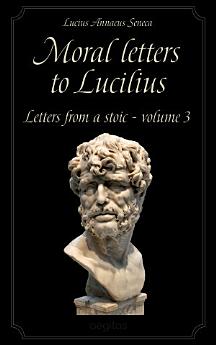Moral letters to Lucilius
জুন ২০১৫ · Letters to stoic কিতাপ 3 · Aegitas
৫.০star
১ টা পৰ্যালোচনাreport
ইবুক
234
পৃষ্ঠা
family_home
যোগ্য
info
reportমূল্যাংকন আৰু পৰ্যালোচনা সত্যাপন কৰা হোৱা নাই অধিক জানক
এই ইবুকখনৰ বিষয়ে
The Epistulae morales ad Lucilium (English: Moral Epistles to Lucilius) is a collection of 124 letters which were written by Seneca the Younger at the end of his life. They are addressed to Lucilius, the then procurator of Sicily, although he is known only through Seneca's writings. In these letters, Seneca gives Lucilius tips on how to become a more devoted Stoic. Lucilius was, at that time, the Governor of Sicily, although he is known only through Seneca's writings. Selected from the Epistulae Morales ad Lucilium, these letters illustrate the upright ideals admired by the Stoics and extol the good way of life as seen from their standpoint They also reveal how far in advance of his time were many of Seneca's ideas - his disgust at the shows in the arena or his criticism of the harsh treatment of slaves. Philosophical in tone and written in the 'pointed' style of the Latin Silver Age these 'essays in disguise' were clearly aimed by Seneca at posterity.
মূল্যাংকন আৰু পৰ্যালোচনাসমূহ
৫.০
১ টা পৰ্যালোচনা
এই ইবুকখনক মূল্যাংকন কৰক
আমাক আপোনাৰ মতামত জনাওক।
পঢ়াৰ নির্দেশাৱলী
স্মাৰ্টফ’ন আৰু টেবলেট
Android আৰু iPad/iPhoneৰ বাবে Google Play Books এপটো ইনষ্টল কৰক। ই স্বয়ংক্রিয়ভাৱে আপোনাৰ একাউণ্টৰ সৈতে ছিংক হয় আৰু আপুনি য'তে নাথাকক ত'তেই কোনো অডিঅ'বুক অনলাইন বা অফলাইনত শুনিবলৈ সুবিধা দিয়ে।
লেপটপ আৰু কম্পিউটাৰ
আপুনি কম্পিউটাৰৰ ৱেব ব্রাউজাৰ ব্যৱহাৰ কৰি Google Playত কিনা অডিঅ'বুকসমূহ শুনিব পাৰে।
ই-ৰীডাৰ আৰু অন্য ডিভাইচ
Kobo eReadersৰ দৰে ই-চিয়াঁহীৰ ডিভাইচসমূহত পঢ়িবলৈ, আপুনি এটা ফাইল ডাউনল’ড কৰি সেইটো আপোনাৰ ডিভাইচলৈ স্থানান্তৰণ কৰিব লাগিব। সমৰ্থিত ই-ৰিডাৰলৈ ফাইলটো কেনেকৈ স্থানান্তৰ কৰিব জানিবলৈ সহায় কেন্দ্ৰত থকা সবিশেষ নিৰ্দেশাৱলী চাওক।








